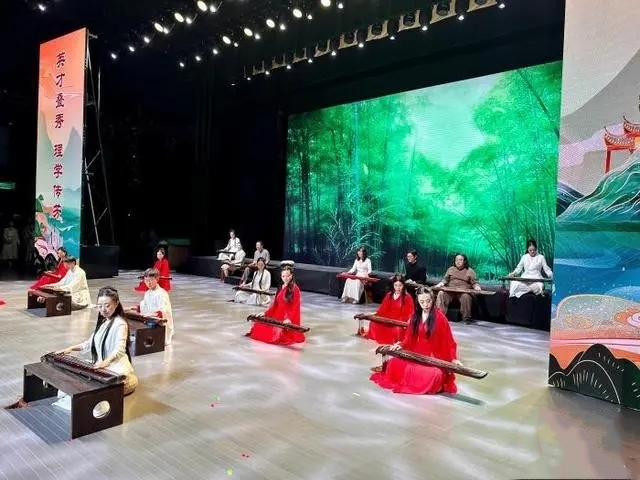Zhu Zi lute music flowing on both sides of the lute master playing friends
A few days ago, with the Fujian school Guqin famous Chen Zhiqiang a song "flowing water", "Zhu Zi Qin sound spread across the two sides, looking for roots to see each other" Zhu Zi cultural exchange activities in Pucheng County, Nanping City, Fujian Province kicked off, more than 60 Taiwan compatriots came to participate in the activity.

As the 15th cross-Straits intangible cultural Heritage sub-forum - Fujian and Taiwan Guqin inheritance and exchange, this event will be Zhu Zi's creation of qin songs and poems into the Fujian school guqin performance, which is loved by guqin lovers. During the three-day event, luthiers from both sides of the Strait will perform, exchange skills training, and carry the way with the piano.
Dr. Chen Shujuan of Taiwan University played the "Question and Answer of Yu Qiao" with the Fujian version of the score, as well as "Gao Shan Qing" by Taiwan Baiyang Orchestra and "Guangling SAN" by Taiwan teacher Lin Fa, etc., to bring up the nostalgia of the guests.
Chen Shujuan, who studies the music aesthetics of Guqin, told reporters that the two books published in Taiwan, "and Guzhai Qin Music" and "Introduction to Qin Science", both introduce the birthplace of Fujian Guqin as Pucheng. Guqin is a common cultural heritage of the two sides of the Straits. Taiwan plays it with silk strings, while the mainland plays it with steel strings. In the future, we will strengthen cooperation with our counterparts on the mainland and improve it together on the basis of promoting traditional arts.
"The location is very special. Pucheng is the birthplace of Guqin in Fujian Province, and Guqin works of the Qing Dynasty had a large circulation at that time." Chen Zhiqiang said in an interview with reporters that most of the versions of Chinese people's plays such as "Yu Qiao Q&A" and "Yangguan Sanjie" come from Pucheng's Qin book, which shows its great influence; Pucheng Guqin has literati style, which is an important way to spread the literati culture unique to Fujian, and also an important characteristic that distinguishes it from other factions.
Pucheng Min-style Guqin is an intangible cultural heritage of Fujian Province. Guqin in the Qing Dynasty developed greatly in Pucheng, divided into four factions, namely Zhe school, Jiang school, Min school and Sichuan school.
As a special associate professor of Guqin performance in Jilin University of the Arts, Taiwan teacher Lin Fa has been teaching in the mainland for 5 years. He combined the atmosphere of Taiwan Guqin with the solid skills of the mainland, and better understood the culture of the mainland literati Guqin through exchanges. He said that with the declaration of the guqin as a world intangible cultural heritage by UNESCO in 2003, and the perfect performance of the Guqin in the opening ceremony of the 2008 Beijing Olympic Games, the guqin has become more and more well-known in the world, and compatriots on both sides of the Taiwan Strait have an increasing responsibility to make the guqin enter the international music scene more quickly.
Zhang Chuanzhen, member of the Central Committee of the Chinese Kuomintang and director of the Taichung City Youth Association, said in her speech at the event that Zhu Zi culture is an important link between the two sides of the cultural exchange, and the Guqin performing artists on both sides have integrated Zhu Zi culture into the guqin performance, which is very innovative. It is hoped that more young people from both sides of the Straits will understand and inherit Zhu Zi culture and Guqin culture together, and join hands to be diligent learners, firm inheritors and enthusiastic communicators of inheriting and carrying forward China's excellent traditional culture.
 渝公网安备 50010702504639号
渝公网安备 50010702504639号